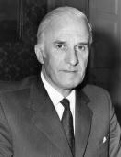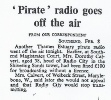© 2014-


Radio City - History (4)
In Parliament MPs pressed the Government to take action against offshore broadcasters in the light of the boarding of Shivering Sands Fort and the subsequent shooting of Reg Calvert. Postmaster General Anthony Wedgewood Benn told the House that the Government's Bill to outlaw offshore stations was ready to be introduced, but this would not happen immediately.
However, the Radio City Affair, with its graphic demonstration of anarchic and violent behaviour spelt the beginning of the end for all British offshore broadcasters -
On 1st July 1966 the Postmaster General announced that legislation to outlaw offshore radio stations would now be introduced before the summer recess. In the light of events at Radio City the Government had rearranged its parliamentary timetable to accommodate such legislation, which only weeks before it had been saying could not be dealt with in that session. Two days after this announcement Postmaster General Anthony Wedgewood Benn was replaced in a Cabinet reshuffle by a new Minister, Edward Short. He was to adopt a far more positive and aggressive attitude towards outlawing the offshore broadcasters.
The Bill to outlaw offshore broadcasting stations -
outlaw offshore broadcasting stations -
Meanwhile, prosecutions were instituted under existing legislation against two other fort-
Eventually, however, the authorities did act and on 31st January 1967 a summons was issued against Mrs. Calvert alleging the illegal use of a radio transmitter on Shivering Sands in contravention of the Wireless Telegraphy Act 1949. At Rochford Magistrates Court on 8th February 1967 Mrs. Calvert defended her station's right to broadcast by arguing that all personnel travelling to and from the Fort were subject to clearance by HM Customs and, when Radio City had been forcibly boarded the previous June police had taken no action because Shivering Sands was held to be outside their jurisdiction. 
The magistrates were not persuaded by Mrs. Calvert's arguments and ruled that the Fort was within British territorial waters. Mrs. Calvert was fined £100, but no order was made for costs or for the confiscation of Radio City's transmitting equipment.
After the court's decision Mrs. Calvert reluctantly decided that the station should close without any undue delay and at 12 midnight on 8th February 1967 Radio City left the air for the last time. The final hour was filled with a nostalgic discussion amongst the Radio City DJs about life on the station and the prospects for the future of radio broadcasting in Britain.

Radio City announcing its impending closure, February 1967


Click on picture to enlarge
Anthony Wedgewood Benn, replaced as Postmaster General
Edward Short, the new Postmaster General
Radio City closing down for the final time, 8th February 1967

Camera User Magazine



BBC News -


The Times 9th February 1967

History
Key Dates
Fort and Location
Technical
Staff
Programmes





Treasure Chest





Back to Britain Gallery

Dorothy Calvert outside Rochford Magistrates Court, February 1967

Back to Radio City
